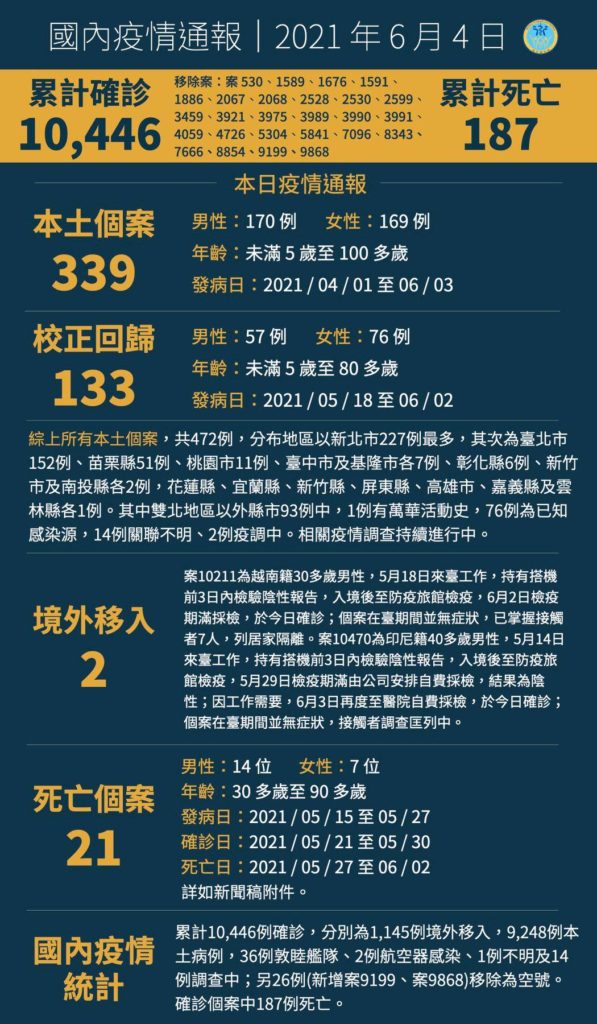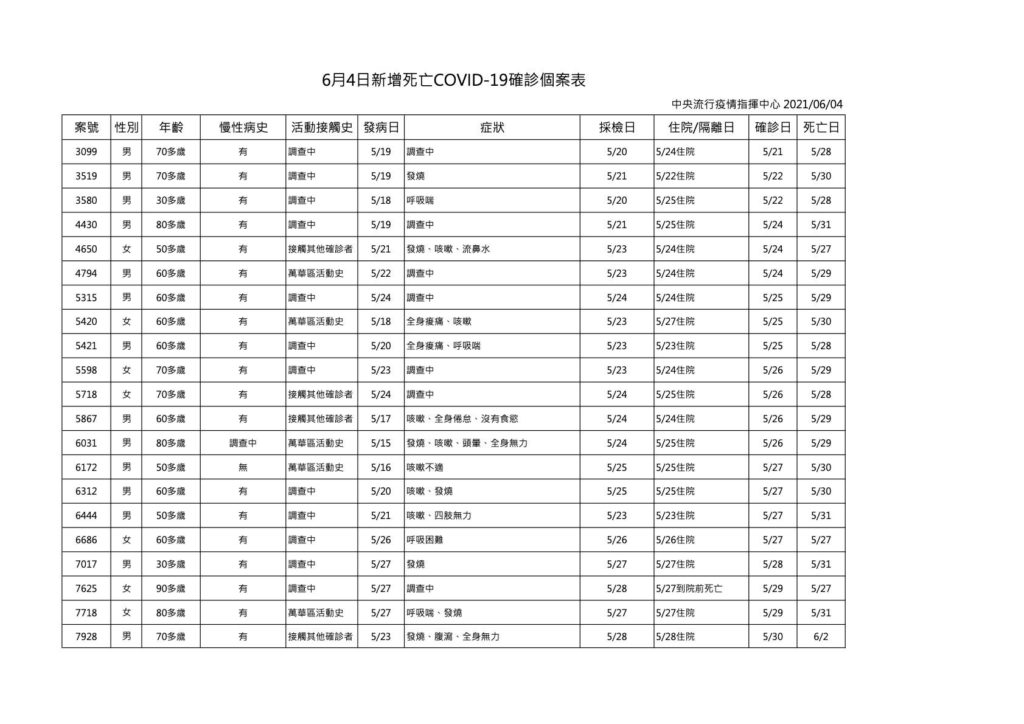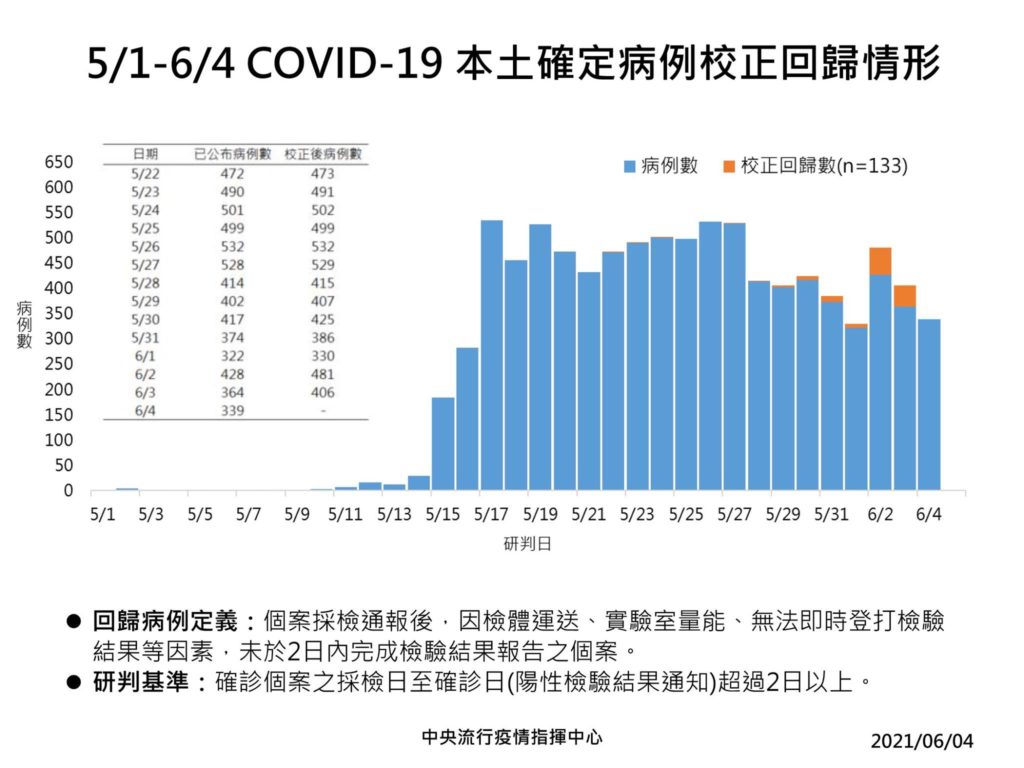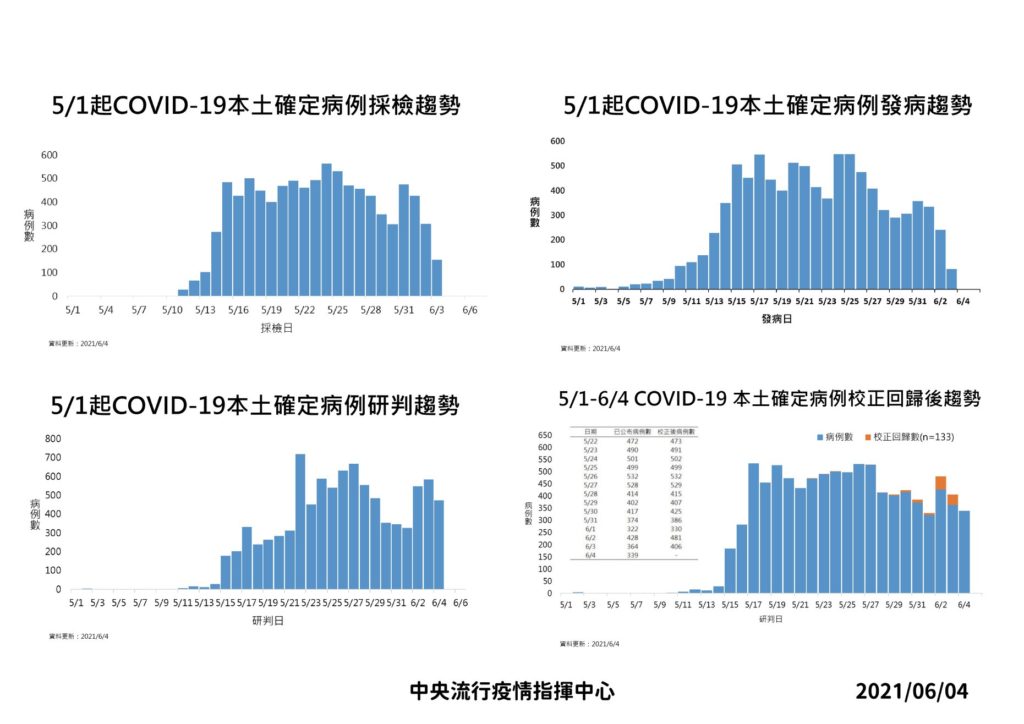by Brian Hioe
語言:
English
Photo Credit: 小蒯 精悅科技/WikiCommons/CC
339 DOMESTIC CASES, 2 imported cases, and 133 cases from the backlog were reported today by the Central Epidemic Command Center (CECC). Twenty-one deaths were announced, representing another record in daily deaths, though most had underlying conditions.
Continuing the pattern seen in previous days, the most cases were in New Taipei, with 227 cases, and Taipei, with 152 cases. There was a spike of 51 cases in Miaoli, due to a cluster among migrant workers at an electronics factory owned by King Yuan. There were 11 cases in Taoyuan, seven cases each in Taichung and Keelung, 6 cases in Changhua County, two cases each in Hsinchu City and Nantou, and one case each in Hualien, Yilan, Hsinchu County, Pingtung, Kaohsiung, Chiayi, and Yunlin. 93 cases were linked to activity in the greater Taipei area, with one case linked to travel history in Wanhua, and 76 cases to other causes. 14 cases are of unclear origin.
Infographic on the new cases (left) and information on the newly announced deaths (right). Photo credit: Ministry of Health and Welfare/Facebook
There is particular concern about the cases in Miaoli. A cluster of 24 cases linked to migrant workers at a King Yuan-owned electronics factory in Miaoli yesterday has led to the factory’s 7,000 workers being tested. After 1,915 workers were rapidly tested, 51 cases already had positive test results, raising concerns about the spread of cases at the factory. The rate of infection at the factory is 2.58%.
According to independent city councilor Zeng Wen-xue, a former NPP member, the factory did not stop work and continued to make workers come in for night shifts before going for testing, raising issues regarding the spread of COVID-19 at the factory, as well as labor practices for migrant workers. Miaoli county magistrate Hsu Yao-chang has come under fire for not holding a press conference about the situation, but instead only posting a video on Facebook.
The number of cases at the factory is likely to increase. The CECC plans to deal with the situation by investigating hot spots in Miaoli and setting up testing stations. There will be investigation of how COVID-19 might spread among migrant workers and there will be monitoring of migrant worker dormitories in order to ensure that social distancing measures are being carried out. To ensure adequate medical capacity, it is possible that COVID-19 patients will be sent to other parts of Taiwan from Miaoli, such as Hsinchu or Taoyuan.
Because of individuals that tested positive for COVID-19 traveling to Xiamen, China or to outlying islands of Taiwan, the CECC is considering issuing health documents to avoid this situation. Members of the public have been called on to maintain social distancing measures in post offices, which have seen some workers infected over the past month.
With the current level 3 alert stated to last until June 14th, Minister of Health and Welfare Chen Shih-chung stated today that there are no plans to lift the level 3 alert, nor are there any plans to elevate to level 4 currently. As the level 3 alert is not likely to be lifted, this means that finals may be cancelled. The CECC will coordinate with the Ministry of Education about whether finals are to be canceled.
According to Chen, with readjusted numbers, the overall trend is still on the decline, even with the uptick in cases in the last few days to similar numbers as previous peaks. The CECC stated that testing capacity is now faster, making it easier to understand the current situation. That being said, the numbers for two days ago were revised from 428 to 480 and for yesterday from 364 to 406 yesterday. Rates of infection at testing sites in New Taipei declined to 1.4% yesterday, down from 2.1% the day before, while rates of infection at testing sites in Taipei declined to 4.9%, though Taipei mayor Ko Wen-je emphasized lags in reporting and that in the short-term, he does not believe level 3 is sufficient to stop the spread of COVID-19.
Further data released by the CECC. Photo credit: Ministry of Health and Welfare/Facebook
1.24 million doses of AstraZeneca donated by Japan arrived today on flight JL809. The plane carrying the vaccines left Japan around 10 AM and arrived at 1:58 PM, 40 minutes ahead of schedule. Taiwan’s representative to Japan, Frank Hsieh, has expressed his gratitude to Japan, while China’s Taiwan Affairs Office has criticized what it sees as Japanese interference in its affairs. Much domestic commentary interprets the donation date as deliberately chosen for June 4th, the anniversary of the Tiananmen Square Massacre.
Details of how Taiwan obtained the vaccines over the course of ten days of negotiating have now been declassified, with Hsieh having met with senior Japanese officials and President Tsai Ing-wen having placed phone calls to work contacts with the Suga administration. Minister of Foreign Affairs Joseph Wu, Vice President William Lai, and acting US ambassador to Japan Joseph M. Young were involved, with dialogue conducted between the US, Japan, and Taiwan. This took place across the course of ten days.
With the new vaccines, Taiwan’s supply of vaccines to date has more than doubled. After categories one to three for vaccination, residents of elderly care facilities, individuals over 70, and workers in key institutions will be prioritized for vaccination. The vaccines, along with other vaccine types that arrive in Taiwan, will be placed under Emergency Use Authorization.
Tainan mayor Huang Wei-cher plans to vaccinate Japanese nationals in Tainan first, as a sign of appreciation. As this is not a large number of people, Chen stated that the CECC did not oppose this, though some Japanese nationals have stated that they would prefer other priority groups to first be vaccinated.
With groups including FoxConn CEO Terry Gou’s Yonglin Foundation claiming that they intend to purchase BioNTech vaccines from Germany for Taiwan, the CECC again reiterated that groups hoping to provide vaccine purchases need to provide authorization documents from the original manufacturer.
Gou currently denies that this is necessary, while the CECC states that this is necessary to prevent fraud. It is not likely that Gou can prove that the vaccines he is sending to Taiwan are German-manufactured vaccines shipped directly from Germany and not Shanghai Fosun-licensed BioNtech vaccines without an authorization document. If Gou is having difficulty producing an authorization document, this raises suspicions. Fo Guang Shan, the Buddhist organization, previously stated that it was hoping to purchase Johnson & Johnson vaccines, but Johnson & Johnson replied that it only intended to sell to governments.
Chen stated that he could understand how vaccine purchases were a difficult process, but that the CECC could assist if needed. Chen further emphasized that the CECC would contact manufacturers as to whether they had, in fact, issued vaccines sent to Taiwan—this is likely a quiet threat by Chen that the CECC will investigate vaccine purchases of unknown origin, so as to investigate possible fraud.
The government & people of #Taiwan🇹🇼 are deeply grateful for #Japan‘s🇯🇵 donation of 1.24 million #Vaccine doses announced by @moteging. The heartwarming gesture spotlights the special friendship shared by both sides & a joint commitment to combating #COVID19. (📸 @MofaJapan_jp) pic.twitter.com/NspdzjMQrZ
— 外交部 Ministry of Foreign Affairs, ROC (Taiwan) 🇹🇼 (@MOFA_Taiwan) June 4, 2021
Tweet by the Ministry of Foreign Affairs thanking Japan for its vaccine contribution
In the meantime, yet another Chinese group with an unclear background has appeared to claim that it will donate millions of vaccines to Taiwan, following on the heels of the KMT-affiliated Sun Yat-sen School claiming that the Beijing Cross-Straits Eastern Cultural Center intended to donate 5 million BioNTech and 5 million Sinopharm vaccines to Taiwan. This group is the China Wuhan Han Kanyang Technology Investment Center (中國武漢康養科技投資中心), which claims it hopes to donate 2 million Shanghai Fosun-licensed BioNtech vaccines and 3 million Chinese domestic vaccines to Taiwan.
Some online backlash on PTT has followed against Minister of Health and Welfare Chen Shih-chung for comments pointing to young people as a group that may be slackening in COVID-19 prevention measures yesterday. Namely, in many places, it’s quite visible to see many elderly not wearing masks, and young people needing to travel to work. Chen’s comments were based on the percentage of cases between 20-39 increasing to 25% recently.
Chen responded to this backlash today by stating that he and the CECC were looking at the numbers and trying to provide advice. Of the 8,979 total cases, 38% are above 60, 40 to 59 are 35.7% of cases, 20 to 39 is 20% of cases, and the rest are 19 or under. However, young people are more likely to be asymptomatic, as a result of which it is possible that they will disproportionately affect others. Chen states that COVID-19 affects individuals of all ages, but more severe cases are among the elderly. Taipei mayor Ko Wen-je also emphasized concern regarding young people in comments today.
With the CECC having reported a case of blood clots linked to the AstraZeneca vaccine two days ago, news reports indicate that the patient was discharged from the hospital on June 1st. To cover medical expenses, the patient’s friends raised over 700,000 NT. When asked, the CECC said it would assist with the patient’s medical expenses.
An employee of Formosa Plastics’ No. 6 Naphtha Cracker has been confirmed positive with COVID-19. The number of students that have been infected with COVID-19 since the start of the current outbreak has now reached 377 as of yesterday.
Eight workers at the Ximen Carrefour, which is close to Wanhua, have tested positive with COVID-19. The Carrefour was widely visited in anticipation of a possible lockdown by members of the public hoping to stock up on supplies.
The mother who underwent C-section to give birth, due to carrying a child at term while being positive COVID-19, is currently being treated in a negative pressure isolation ward. The child is reportedly healthy.
The Executive Yuan passed the third supplementary budget for COVID-19 related measures yesterday. This consists of 27.85 billion NT, including 1.09 billion NT allocated to fighting COVID-19 and 26.79 billion NT for economic relief. The first economic relief funds from the Executive Yuan to affected occupation groups, such as farmers, fishermen, taxi drivers, tour guides, and others, are expected to be distributed today, with the 1988 hotline used to provide information about the funds.
Livestream by President Tsai Ing-wen after the arrival of the vaccines from Japan this afternoon
Free Taiwan Party chair Tsay Ting-kuei took to Facebook yesterday to call for Taiwanese citizens to participate in trials of domestic vaccines. In response to criticisms that domestically-manufactured vaccine companies were planning to skip phase 3 trials, at least Medigen has stated it will now seek to do phase three testing, while United Biomedical stated that it originally intended to do phase three trials, until the central government decided to increase the size of phase two trials instead. Tsay has come under fire for having already been vaccinated in the US, however.
Taipei mayor Ko Wen-je and New Taipei mayor Hou You-yi have been questioned as to whether they will allow phase 3 trials to take place in Taipei and New Taipei. Ko stated that testing would take place in order to allow Taiwanese vaccines to obtain international recognition and that Taipei would assist where needed, though he has attacked the credibility of domestically-manufactured vaccines in the past.
New Taipei mayor Hou You-yi announced that clothing stores, jewelry stores, and fortune tellers would be closed in New Taipei yesterday. When asked if such stores would also be closed in Keelung, Keelung mayor Lin Yu-chang has stated that such stores are not places where large crowds gather and that traditional markets are still of greater concern. Lin has also called for the greater Taipei area to receive priority in terms of receiving vaccines from the new shipment.
The New Taipei government currently emphasizes low medical capacity, stating that it expects low capacity in the next four days, and that it currently only has 217 beds available. New Taipei will lift parking fees, in the hopes this allows for easier parking, and that individuals stay home. Taipei currently states that it has 1,363 beds.
The US announced donations of another wave of 25 million vaccines globally yesterday, with this expected to take place primarily through the COVAX international vaccine sharing agreement, with 75% of vaccines going to COVAX. Taiwan will be included in the seven million vaccines to be sent to the Asia Pacific region. Vaccines will be sent before the end of June, though it is not clear how many vaccines will be sent to Taiwan. When questioned about rumors that vaccines from the US would arrive as early as tomorrow, Chen Shih-chung stated that he did not know the timeline for US vaccine distribution, though he was highly appreciative of the US.
In a live-stream about Japan’s donation of vaccines to Taiwan this afternoon, Tsai Ing-wen, too, thanked the US for its vaccine donation and stated that Taiwan was open to communicating with other countries about vaccine acquisition, thanking diplomatic staff worldwide for working on the issue. Tsai thanked Terry Gou and Fo Guang Shan for efforts at purchasing vaccines, even if this has not been successful, and again stressed the need for confidentiality in vaccine shipments to prevent the possibility of interference. Tsai closed by reiterating that progress was being made on setting up a distribution system for vaccines.





